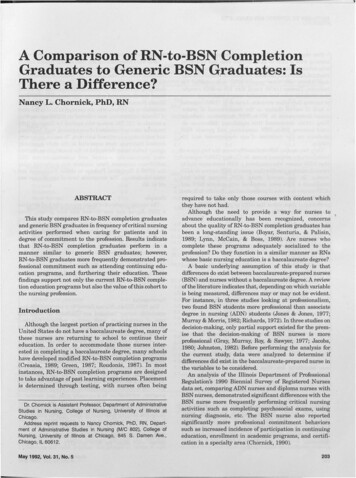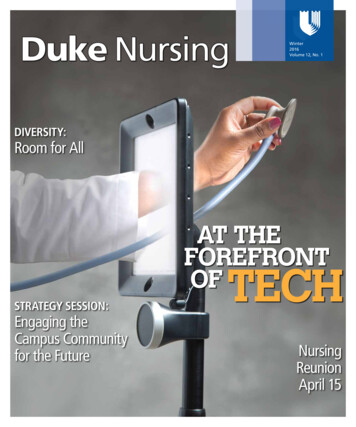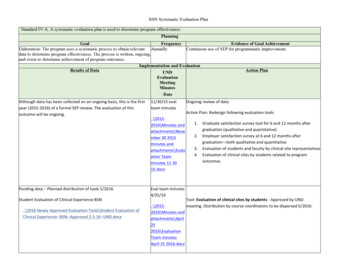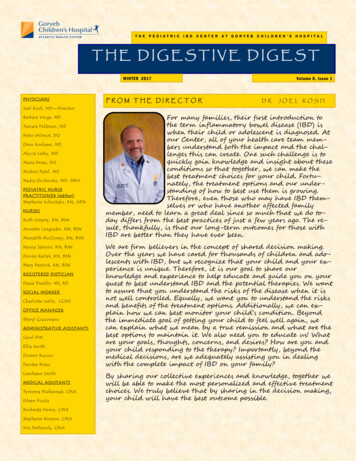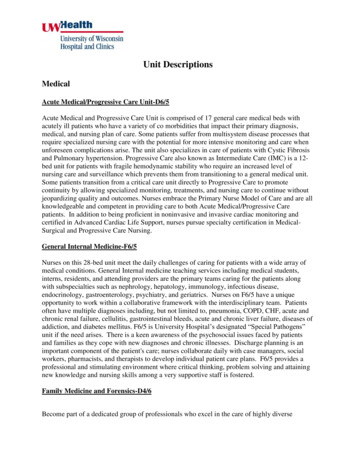
Transcription
Unit DescriptionsMedicalAcute Medical/Progressive Care Unit-D6/5Acute Medical and Progressive Care Unit is comprised of 17 general care medical beds withacutely ill patients who have a variety of co morbidities that impact their primary diagnosis,medical, and nursing plan of care. Some patients suffer from multisystem disease processes thatrequire specialized nursing care with the potential for more intensive monitoring and care whenunforeseen complications arise. The unit also specializes in care of patients with Cystic Fibrosisand Pulmonary hypertension. Progressive Care also known as Intermediate Care (IMC) is a 12bed unit for patients with fragile hemodynamic stability who require an increased level ofnursing care and surveillance which prevents them from transitioning to a general medical unit.Some patients transition from a critical care unit directly to Progressive Care to promotecontinuity by allowing specialized monitoring, treatments, and nursing care to continue withoutjeopardizing quality and outcomes. Nurses embrace the Primary Nurse Model of Care and are allknowledgeable and competent in providing care to both Acute Medical/Progressive Carepatients. In addition to being proficient in noninvasive and invasive cardiac monitoring andcertified in Advanced Cardiac Life Support, nurses pursue specialty certification in MedicalSurgical and Progressive Care Nursing.General Internal Medicine-F6/5Nurses on this 28-bed unit meet the daily challenges of caring for patients with a wide array ofmedical conditions. General Internal medicine teaching services including medical students,interns, residents, and attending providers are the primary teams caring for the patients alongwith subspecialties such as nephrology, hepatology, immunology, infectious disease,endocrinology, gastroenterology, psychiatry, and geriatrics. Nurses on F6/5 have a uniqueopportunity to work within a collaborative framework with the interdisciplinary team. Patientsoften have multiple diagnoses including, but not limited to, pneumonia, COPD, CHF, acute andchronic renal failure, cellulitis, gastrointestinal bleeds, acute and chronic liver failure, diseases ofaddiction, and diabetes mellitus. F6/5 is University Hospital’s designated “Special Pathogens”unit if the need arises. There is a keen awareness of the psychosocial issues faced by patientsand families as they cope with new diagnoses and chronic illnesses. Discharge planning is animportant component of the patient's care; nurses collaborate daily with case managers, socialworkers, pharmacists, and therapists to develop individual patient care plans. F6/5 provides aprofessional and stimulating environment where critical thinking, problem solving and attainingnew knowledge and nursing skills among a very supportive staff is fostered.Family Medicine and Forensics-D4/6Become part of a dedicated group of professionals who excel in the care of highly diverse
medical and surgical patients!D4/6 is an 18 bed Family Practice unit that provides support to patients with acute illnesses andmanagement of patients with chronic conditions in a team-oriented environment. Additionally,D4/6 nurses provide care in a 10 bed Forensics unit for adult male patients who are inmates inthe Department of Corrections for the State of Wisconsin.The Family Practice and Forensics unit provides an exceptional opportunity for nurses todevelop and utilize their critical thinking skills in a dynamic and supportive setting. You willbecome part of a group that fosters highly engaged Nurse/Provider relationships and supportscollaborative work on individualized plans of care.An emphasis on teamwork makes the Family Practice and Forensics unit a REMARKABLEplace to practice.Clinical Research Unit -D6/6Clinical Research Nursing is the specialized practice of professional nursing focused onmaintaining equilibrium between care of the research participant and fidelity to the researchprotocol. This specialty practice incorporates human subject protection; care coordination andcontinuity; contribution to clinical science; clinical practice; and study management throughout avariety of professional roles, practice settings, and clinical specialties (International Associationof Clinical Research Nurses. (2012) "Enhancing Clinical Research Quality and Safety ThroughSpecialized Nursing Practice". Scope and Standards of Practice Committee Report). The ClinicalResearch Unit nursing staff provides comprehensive clinical research support and patient care ina collaborative, interprofessional approach with clinical research investigators. The inpatientoutpatient unit includes 14 inpatient beds, 2 sleep study rooms, research specimen processinglab, exam room, and a 5-bay treatment center. The unit is funded under a grant from theNational Institutes of Health (NIH). The CRU Nurse combine’s expertise in care of subjectsenrolled in clinical trials with medical/surgical nursing skill. Examples of research includestudies related to asthma/allergy, hematology/oncology, Alzheimer’s disease,behavioral/psychiatric, and endocrine and metabolic system, rheumatology, and sleep disorders.Heart & VascularHeart and Vascular Progressive Care-D4/5The Heart and Vascular Progressive Care Unit is a fast-paced surgical unit that offers anopportunity to advance your nursing skills and become part of a wonderful team. This 15 –bedtelemetry unit cares for both general and intermediate level patients. Our patients have a widerange of acute and chronic diseases. Patients on our unit undergo procedural or surgicalinterventions including abdominal and thoracic aneurysm repairs- both open and endovascular,carotid endarterectomies, limb saving lytic therapies, amputations, lower extremity bypasses andangioplasties.Cardiology Intermediate Care-F4/5
The Cardiology Unit is a medical cardiology stepdown unit located adjacent to the CardiacIntensive Care Unit. Primary nursing care is delivered for cardiology patients requiringdiagnostic testing and state-of-the-art, non-surgical interventions for coronary artery disease,congestive heart failure and dysrhythmia treatment. There is a strong emphasis on patienteducation on this 16-bed unit.Cardiothoracic Surgery, Heart and Lung Transplant-B4/5B4/5 is an acuity adaptable unit focused on cardiac surgery, thoracic surgery and heart/lungtransplantation. Patients on this 27-bed unit can be ICU, Intermediate (IMC) or General carestatus. Most patients are admitted following scheduled or emergent surgical interventionsincluding coronary artery bypass, valve replacement or repair, thoracotomy/wedge resection,pneumonectomy, lobectomy or esophagogastrectomy. Patients are also admitted for hearttransplantation, lung transplantation, and medical management following lung transplant. B4/5cares for all patients who require a ventricular assist device (VAD) including newly implantedbridge-to-transplant and destination therapy VAD patients. Nursing staff on the acuity adaptableunit must be highly competent and work as part of a team to care for patients at all levels ofacuity in addition to having specific competencies for the Cardiothoracic Surgery and Transplantpopulation. Nurses complete extensive training and have educational opportunities throughoutthe year to make sure the B4/5 team remains the best! The B4/5 Acuity Adaptable Unit isperfect for the nurse who loves variety and change, critical care and patient contact, with theopportunity to teach complex, specialized information to patients and families.Surgical InpatientGeneral Surgery (F4/6)The F46 unit is a 28 bed General Surgery unit. It offers an excellent opportunity to learn aboutcare for patients with a variety of surgical conditions. This unit offers the nurse an opportunity togain a broad base of skills and clinical knowledge. Nurses on this unit are highly competent tocare for a variety of high acuity patients, while maintaining a focus of compassionate patient andfamily centered care. The general surgery patient population is a surgical specialty that focuseson abdominal organs, e.g., intestines including esophagus, stomach, small bowel, colon, liver,pancreas, gallbladder, and bile ducts, as well as diseases involving the breast. A strong emphasisis placed on professional development through continuing education for nursing staff,professional certifications, development of unit resource nurses, mentoring staff and students,while maintaining a high standard of care for all patients and their families. It will offermotivated nursing staff the opportunity to work with an interdisciplinary team, committed tomaintaining high standards of patient care, excellent communication, while adhering to theprinciples of Primary Nursing and the Interdisciplinary Model of Care.General Trauma/Trauma and Surgical IMC (F4/4)Traumatic injury is a disease process unto itself requiring specialized and experiencedmultidisciplinary treatment and specialized resources. According to the CDC, the leading causesof trauma are motor vehicle accidents, falls, and assaults. The F4/4 Trauma/Trauma andSurgical IMC is a 26-bed unit that consists of a 12-bed intermediate care unit (IMC) for traumaand surgical patients and a 14-bed general care unit.
The Trauma and Surgical Intermediate Care Unit on F4/4 provides comprehensivemultidisciplinary care to patients who have sustained multi-system trauma as well as high acuitysurgical patients. Major clinical activities may include chest tube management, tracheostomymanagement, complex wound care, orthopedic stabilization, medication and blood productadministration, rehabilitation preparation, mechanical ventilation, central venous pressure andarterial line monitoring and moderate sedation. The trauma general care unit provides care formulti-system trauma patients that are admitted to the unit directly from the emergencydepartment, ICU or IMC.This unit offers motivated nursing staff the opportunity to work with an interdisciplinary teamcommitted to maintaining high standards of patient and family centered care, excellentcommunication, and adheres to the principles of Primary Nursing and the InterdisciplinaryModel of Care. This unit is a model work culture that expects and maintains respect for eachother, patients and families in all interaction and communication. Nursing staff gain advancedknowledge and skills in a supportive academic environment that fosters the development ofcritical thinking skills, and an understanding of the impact of trauma on the patient and family.Gynecology, Urology, Plastic Surgery, and OtolaryngologyNurses on this 28-bed unit meet the acute care needs of gynecology and urology patients as wellas those from plastic reconstructive surgery and ENT services. Nurses provide care for patientsreceiving new and innovative surgical procedures and specialize in care of patients requiring oneof the three lead-lined patient rooms for radioactive implants. Nurses plan individualized patientcare during hospitalization as well as home care upon discharge. Such a combination of patientpopulations and the opportunity to participate in the most advanced surgical procedures beingperformed today provides wonderful learning opportunities and challenges nurses by requiring abroad range of surgical and medical nursing skills.TransplantUW Hospital’s multi-organ transplant program is among the largest and most successful in thecountry. The Transplant Unit with 32-beds offers professionals the chance to practice on theforefront of kidney, liver and pancreas transplant primary nursing. Primary nurses teach patientsabout self-management of medications, dietary change, and assessing rejection symptoms-whilepreparing for discharge. This unit offers the nurse to work with an interdisciplinary teamcommitted to maintaining high standards of patient and family centered care, excellentcommunication with all disciplines.OrthopedicsThe B6/4 Orthopedic unit has 27 general care beds which specializes in orthopedic surgeriesrelated to spine, hips, acute traumatic orthopedic injuries, orthopedic oncology, and hardwareremoval. Caring for these patients requires specialized multidisciplinary treatment andresources. We also care for medical and surgical patients from other services as needed. Patientsmay be admitted directly from the emergency department, direct admissions from an outsidehospital, PACU, or may be transferred from another inpatient unit.This unit offers motivated nursing staff the opportunity to work with an interdisciplinary teamthat is committed to maintaining high standards of quality patient and family centered care. TheB6/4 Orthopedic unit has a model healthy work culture in which we expect and maintain arespectful environment for each other, our patients and families in every form of communication
and all interactions. Our nursing staff gains advanced knowledge and skills in a supportiveacademic environment that fosters the development of critical thinking skills whileunderstanding acute traumatic injuries, surgeries and diagnosis that has both short and long-termimpact on the patient and the family.Our team consists of nurses, advanced practice practitioners, physicians, pharmacists, respiratorytherapists, case manager, social worker, dieticians, physical and occupational therapy, andspiritual care services, who work together to create an environment where comprehensive healthcare is provided to all patients and families. As a nurse, you will be an active member of thismultifaceted team.Neurosciences General Care Unit (D6/4)Nurses on this 25-bed unit are integral team members of The Joint Commission-certifiedComprehensive Stroke Unit, caring for patients with ischemic and hemorrhagic strokes. Theyalso specialize in treating and managing patients with head and spinal cord injuries, electivespine cases, tumors of the central nervous system, cerebral aneurysms, multiple sclerosis,Guillain-Barre, and various neurodegenerative diseases. Nurses are also involved in theevaluation and treatment of patients with seizure disorders in our Level 4 ComprehensiveEpilepsy Monitoring Program, which is a sub-unit within the total 25 beds.UW Health at The American Center – Medical/ Surgical UnitNurses working on the Inpatient Medical Surgical Unit, at the American Center will have theopportunity to provide care to both medical and surgical patients. High volume elective surgicaladmissions will be orthopedic patients, including joint replacement, spine surgery, and bothupper extremity and lower extremity procedures. A smaller volume of the elective surgicalpatients will come from Neurosurgery spine, Urology, General Surgery, Endocrine, andBariatrics.In addition to the surgical population, nurses will care for a variety of medical patients includingthose with pneumonia, sepsis, COPD, CHF and other acute and chronic medical conditions. Themedical/surgical unit offers inpatient dialysis, with a two-chair dialysis suite located on the unit.Telemetry monitoring can be provided for all patients, and a limited number of IMC statuspatients will be cared for at the American Center.This unit offers motivated nursing staff the opportunity to not only work in a new physicalenvironment but will give them the chance to expand their skills beyond that of a single specialtyarea of nursing practice.Surgical ServicesInpatient Operating RoomMore than 13,500 surgical procedures are performed per year at The University Hospital in theInpatient Operating Rooms. There are 27 Inpatient Operating Room suites plus 1 IntraoperativeMRI suite. A wide range and variety of surgical procedures are performed within the followingsurgical specialities; neurosurgery, cardiothoracic, peripheral vascular, orthopedic, generalsurgery, ophthalmology, otolaryngology, plastics, gynecology, urology, as well as, burn,oncology, transplant and trauma related procedures. Nurses can circulate as well as scrub and arean integral part of surgical teams.
Inpatient Post-Anesthesia Care Unit (PACU)This newly remodeled has 22 individual rooms and 2 double rooms which provide each patientwith a quiet, soothing environment to recover from anesthesia following surgery orprocedures. Nurses are responsible for assessing, diagnosing, intervening, evaluating,coordinating, and facilitating concentrated care essential during the immediate post anestheticperiod for a wide variety of surgical and procedural patient populations. Each patient receivescontinuous monitoring and observation as they emerge from the effects ofsedation/anesthesia. For the critical care patient population this may include hemodynamicmonitoring and/or titration of medications. Airway and pain/comfort management are alsopriorities. Nurses work closely with their surgical, anesthesia, and Pain Service colleagues toidentify the most appropriate plan of care for the patient. Nurse to patient staffing ratio is mostoften one-to-one or one-to-two (and never exceeds one-to-three) providing the utmost individualattention to each patient.Outpatient Operating RoomThis unit is a nine-suite operating room for cases scheduled with general or moderateanesthesia. University Hospital Outpatient Operating Room has an annual caseload of over8,000 outpatient operative cases.Outpatient Pre/Post-Op, Outpatient PACU and First Day SurgeryOutpatient Surgery Center (OSC) is a 27-bed pre/post op unit and six bay post anesthesiarecovery unit (PACU) for outpatient surgeries. First Day Surgery (FDS) is a 35-bed holdingarea/pre/post op unit for inpatient/outpatient surgeries. Also serves as a holding area for inpatientsurgical patients. Both areas are staffed with nurses experienced in the care of surgical patients.AFCH Post Anesthesia Care Unit (PACU)This 10-bay unit provides immediate post-surgical care for pediatric patients who undergosurgery. Nurse Clinicians are responsible for assessing, diagnosing, intervening, evaluating,coordinating, and facilitating the concentrated care necessary in the immediate post anestheticperiod for a multi-varied surgical pediatric patient population. Each pediatric patient receivescontinuous monitoring and observation as they emerge from the effects of sedation/anesthesia.Airway and pain management are a priority. Nurse Clinicians work closely with their surgicaland anesthesia colleagues to identify the most appropriate plan of care for the pediatric patient.Nurse Clinician to patient staffing ratio is one-to-one providing the utmost in individual attentionto each pediatric patient.AFCH Pre/Post OPThis 30-bed unit provides pre-operative and post-operative care for pediatric surgicalpatients. Nurse Clinicians are responsible for admitting patients pre-operatively andcollaborating with the anesthesia and surgical team to prepare children and their families forsurgery. Nurse Clinicians in this area are specially trained to care for children having inpatient
and outpatient procedures. This environment provides post-operative care for all childrenhaving outpatient surgical procedures.AFCH Operating RoomThis operating room has 8 OR suites, a hybrid OR, and a shared MRI OR providing care topediatric surgical patients from neonate to 18 years undergoing both inpatient and outpatientsurgical procedures. Nurses are an integral part of the surgical team that performs over 6000procedures each year in a multitude of specialties.The American Center Pre/Post & PACUThe Preoperative and postoperative patient care area is in the Universal Care Center (UCC) ofthe West Wing of UW Health at The American Center. The UCC has 48 rooms that can beutilized for the Emergency Department, Radiology and Pre/ Post Op patients. One to two daysprior to the patient’s scheduled surgery an RN calls the patient to review their medical history,medications, and what to expect the day of surgery. The RN also reinforces teaching andanswers any questions. Nurses work closely with the interprofessional team to prepare patientsfor surgery. Patients can be in inpatient or outpatient status for surgery. Outpatients will returnto the UCC for Phase II recovery to receive further pain management, recovery from anesthesiaand discharge teaching before going home. Nurses may also work in the Post Anesthesia CareUnit (PACU) which is a 14-bay recovery room. Nurses are responsible for assessing, diagnosing,intervening, evaluating, coordinating, and facilitating care necessary in the immediate postanesthetic period for surgical patients.The American Center Operating RoomThirteen state of the art Operating Rooms with 1 additional room, as surgical volumes cangrow. Cases performed include orthopedic (sports medicine, joints, spine, upper and lowerextremity), general surgery, (weight loss surgery, endocrine, minimally invasive), neuro-spine,urology, vascular access and plastics.Critical CareTrauma and Life Support-B6/3The Trauma Life Support Center (TLC) consists of an interdisciplinary team of health careprofessionals delivering comprehensive care for patients and families with complex medical orsurgical illnesses as well as severe traumatic injuries. Together with physicians, pharmacists, andrespiratory, physical, and occupational therapists, nurses utilize evidence-based practices andexpert communication skills to provide sophisticated interventions that ensure optimal patientand family outcomes in this 24-bed ICU. TLC offers highly motivated nurses an opportunity togain advanced knowledge and skills in a supportive academic environment that fosters thedevelopment of ICU critical thinking and communication skills, as well as a strong continuingeducation program in both nursing and interdisciplinary settings.Burn
The Burn Unit cares for patients with a wide variety of skin conditions, including burns,frostbite, necrotizing infections, and wounds of numerous other etiologies. The 7 bed unit is anAmerican Burn Association verified Burn Center and is the regional burn center for patientsfrom a large geographical area. Nurses provide care for patients across the lifespan, from infantsto geriatrics, and for patients ranging in acuity from intensive care through general care. Treatingpatients from the acute phase through rehabilitation and discharge planning to home. The BurnUnit provides highly specialized care, including post-operative recovery, wound VAC therapy,and dressing changes specific to each patient’s wound. The Burn Unit is an extremely dynamicenvironment where teamwork and multi-disciplinary approach are highly valued.Emergency DepartmentThe Emergency Department offers comprehensive services with access to a full team ofsubspecialists for our local and regional patients and referring hospitals and organizations. Over60,000 patients per year are treated on an urgent and emergent basis in our 58-bed department;which includes a 10-bed observation unit. Our staff coordinates care with ground ambulancesand Med Flight for severely ill and injured patients. As the focal point for emergency care, theEmergency Department performs diagnostic interventions, offers immediate consultations forcardiac catheterization, Level I trauma care, acute stroke care, burn center, operative procedures,special diagnostic testing and definitive care for all patients – pediatrics to adults.The American Center - Emergency DepartmentThe American Center (TAC) Emergency Department features a beautiful facility, state of the artequipment, streamlined processes, and experienced ED providers and staff. Care is provided toover 17,000 patients per year within our community with the utmost attention to a positivepatient care experience.Neurosciences ICUNurses will provide intensive care to patients who are acutely ill from a neurological deficit.This unit specialized in subarachnoid hemorrhages, un-stables ischemic and hemorrhage strokes,traumatic brain and spinal cord injury. The Neuroscience ICU is a 18 bed ICU which providesICP monitoring and hemodynamic monitoring of unstable patients. The Neuroscience ICU willprovide nurses the opportunity to work with severe neurological, neurovascular andneurosurgical populations.Cardiac Medical Intensive Care-F4/M5Nurses on this seven-bed unit provide high quality intensive care to critically ill cardiac patients.Patients are likely to be individuals with myocardial infarction, congestive heart failure, rhythmdisturbances, pulmonary edema, or cardiogenic shock. In addition, medical patients with sepsis,acute renal failure, hematologic disturbances and respiratory failure may be admitted to this unit.Primary nursing care is delivered with a mixture of technological expertise and a positivecommitment to meeting patient and family needs.Heart and Vascular Procedure Center (Cath and Electrophysiology Labs)
The Heart and Vascular Procedure Center (HVPC) is a dynamic procedural area where nursespractice with autonomy to provide quality care to a wide variety of patients undergoingcardiovascular procedures. The Nurse Clinician in the HVPC has a strong critical carebackground, is skilled in providing moderate sedation and is ready to expand their skill set toinclude a specialty in cardiovascular procedures. Our nursing staff is part of a talentedmultidisciplinary team working together to deliver quality care to patients undergoing invasivecardiovascular procedures from diagnostic elective cases to emergent STEMI (heart attack)patients. Our staff receives ongoing, extensive training to achieve and maintain competency in avariety of procedures and treatment modalities. Our department, the Heart and VascularProcedure Center (HVPC) has 7 procedure rooms including three coronary labs, one hybridcardiovascular (CV) lab, two electrophysiology (EP) labs, and one pediatric hybrid CV and EPprocedure lab in the American Family Children’s Hospital. Our department also includes a 14bed Pre/post care unit. Procedures are performed on patients from pediatric through geriatricpopulations and include: diagnostic, interventional cardiac catheterization and structural heartprocedures such as, transcatheter aortic valve replacement (TAVR), MitraClip,Watchman, balloon valvuloplasty, ASD/VSD/PFO/PDA closures, ventricular assist deviceplacement, intra-aortic balloon pump placement and pericardiocentesis. We also performelectrophysiology procedures on adult and pediatric populations including: temporary andpermanent pacemaker insertions, loop recorder insertions, implantable cardioverter-defibrillatorinsertions, laser lead extractions, diagnostic EP studies and complex ablations including atrialfibrillation ablations. We also perform cardioversions in our prep/recovery unit. Diagnostic andinterventional peripheral vascular procedures include: limb salvage procedures, carotidangioplasty and stenting, abdominal angiography and coiling, and IVC filterplacement/retrieval. We perform interventional nephrology procedures such as: diagnostic andinterventional fistulogram, temporary and tunneled hemodialysis catheter insertion andperitoneal dialysis catheter placements.PediatricsPediatric Hematology/Oncology, Neuroscience, ENT and PlasticsNurses on this 16-bed unit care for children from infancy through adolescence and deliver carethrough the Primary Nursing Care Delivery Model. Included on this unit is a four-bed segregatedbone marrow transplant area for children who are highly immunocompromised. Nurses willprovide care to children receiving state of the art therapy for hematology, oncology, andimmunology diagnosis. These treatments include MIBG, immunotherapy, hematopoietic stemcell or bone marrow transplant. In addition, nurses care for children and adolescents requiringmedical and surgical interventions for complex neurological, plastics and ear, nose and throatdiagnosis. The nursing staff on this unit provide a holistic and family centered approach to care,facilitate active participation of patients and family members in their treatment and create anenvironment that fosters opportunities for normalized growth and development.General Care PediatricsThe General Pediatric Unit is a 24-bed high acuity, fast-paced unit that provides manyopportunities for nurses who are interested in caring for children. Nurses care for children fromNewborn to adolescent who have a wide variety of complex medical and surgical problems,
including organ transplantation, congenital anomalies, cardiovascular defects, trauma, urology,orthopedic traumas/surgeries, children with behavioral or mental health issues, children whohave experienced abuse or neglect, and general medical patients. The care that is given iscustomized to the individual patients and family's physiological, emotional, cultural and spiritualneeds. Our focus is health orientated; we will work in a collaborative manner by using ourcutting-edge skills in assessments, interventions and treatment to restore our children and theirfamily to their highest level of recovery. The nurse works very closely with a multidisciplinaryteam which includes Physicians, Respiratory therapy, Physical therapy, Psychology, Surgeons,Case manager, Social worker and Child life specialists to coordinate a holistic plan of care forthe patient and family.Pediatric Intensive CareThe Pediatric ICU offers challenging and rewarding critical care nursing opportunities. Patientages range from newborn through adult. PICU nurses provide comprehensive care for patientsadmitted with a wide variety of both medical and surgical issues including; acute head injuries,critical neurological disorders, pulmonary diseases, cardiac anomalies, organtransplantation, multi system organ failure, and ECMO. Primary nurses, with a highly skilled andcommitted multidisciplinary team, provide family-centered care to critically ill or injuredchildren and their families in this state-of-the art 21-bed unit.Neonatal Intensive CareThe Neonatal Intensive Care Unit (NICU) at American Family Children’s Hospital offerschallenging and rewarding critical care nursing opportunities. Nurses at this state-of-the-art,level IV NICU provide car
broad range of surgical and medical nursing skills. Transplant UW Hospital's multi-organ transplant program is among the largest and most successful in the country. The Transplant Unit with 32-beds offers professionals the chance to practice on the forefront of kidney, liver and pancreas transplant primary nursing. Primary nurses teach patients

